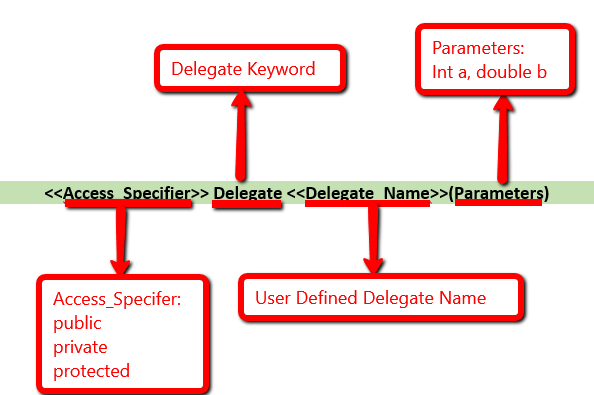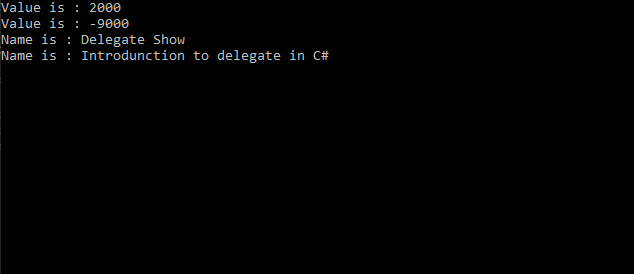Delegate is a reference type variable that can hold the reference of a function. It is like a pointer to a method, in C++ or C. Delegates are implicitly driven from the System.Delegate Class. We can say that it is an object, or reference type variable, which refers to a function, and can hold the reference of a method. Delegates are used to implement events or callback functions.
Delegate Syntax in C#
<<Access_Specifier>> delegate <<Return Type>> <<Delegate_Name>>(Parameters)

Delegate
Declaration of Delegate in C#
Public delegate int Prime_Delogate(int number);
Why we use Delegate?
A method may have more than one parameter of a different data type. If you want to pass a method into the function’s parameters, then you can use delegates. You can also use delegates to handle the event handler and callback function.
Using delegates, a programmer can encapsulate the reference to the function into a delegate object. Keep in mind that the function’s return type and data type always must match with the delegate’s return type and data type.
Example of Delegate in C#
Here is the simple example of delegates in C#. The code below successfully compiles, and the output is also given below.
using System;
using System.Collections.Generic;
using System.Linq;
using System.Text;
using System.Threading.Tasks;
namespace ConsoleApplication14
{
class Program
{
public delegate void display(int value);
public delegate void show(String name);
static void Main(string[] args)
{
display del_Display = Methodshow;
del_Display(2000);
del_Display(-9000);
show del_show = Name;
del_show("Delegate Show");
del_show("Introdunction to delegate in C#");
Console.ReadLine();
}
public static void Mwthodshow(int val)
{
Console.WriteLine("Value is : {0}", val);
}
public static void Name(string name)
{
Console.WriteLine("Name is : {0}", name);
}
}
}

Delegate Output
Program Explanation
In the above program, we have declared two delegates of type void. The delegates have one parameter of type int and char, respectively. In the main function, we have declared the delegate variable of type display and assigned the Methodshow function name.
We are now calling the del_display delegate, which will result in a call of the Methodshow function. Similarly, declaring the show variable and assigned the name function. Now, invoking the del_show delegate which will result in the call of the name function and result will be printed on the console.

Comments